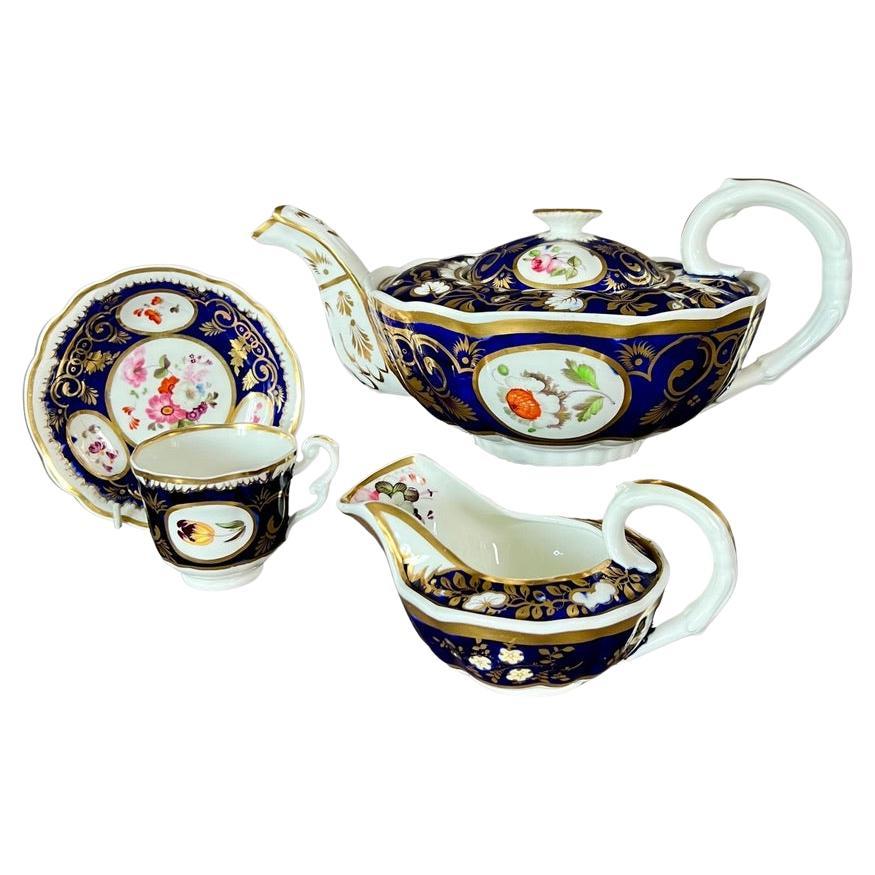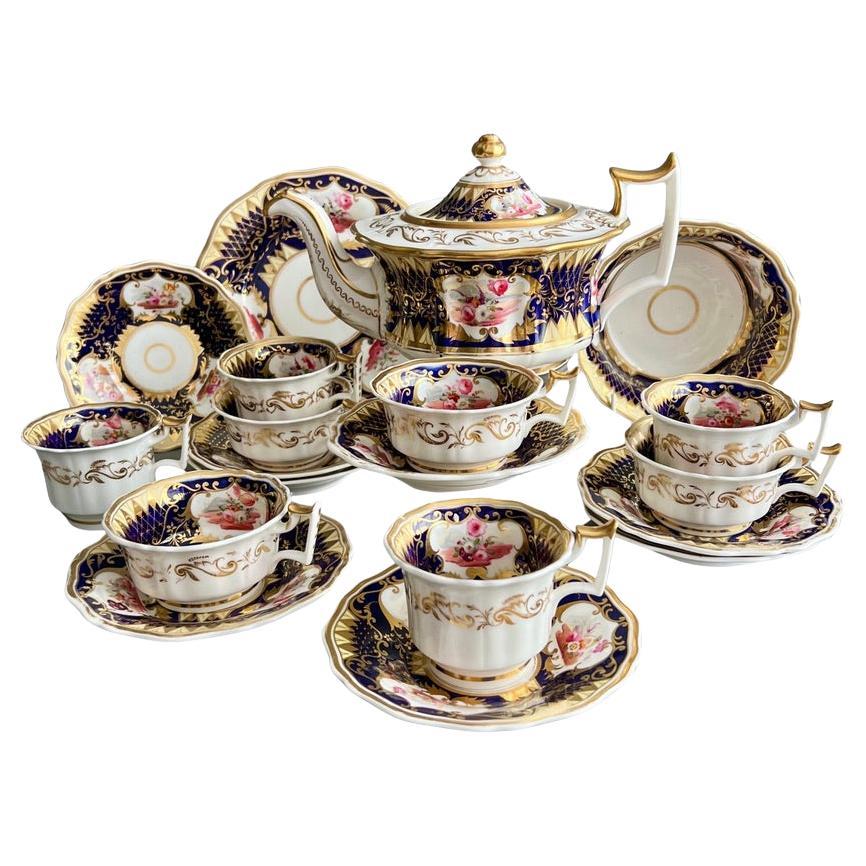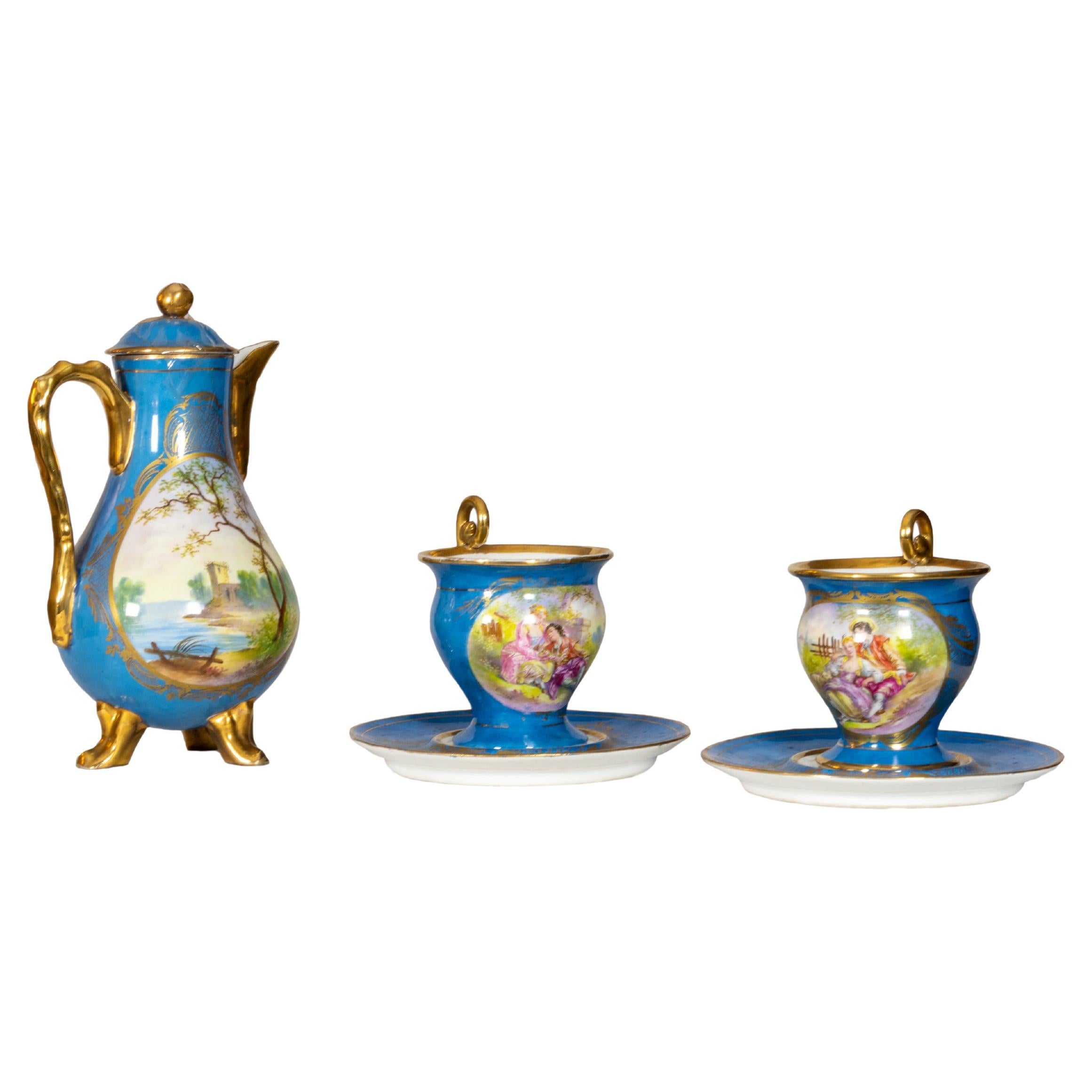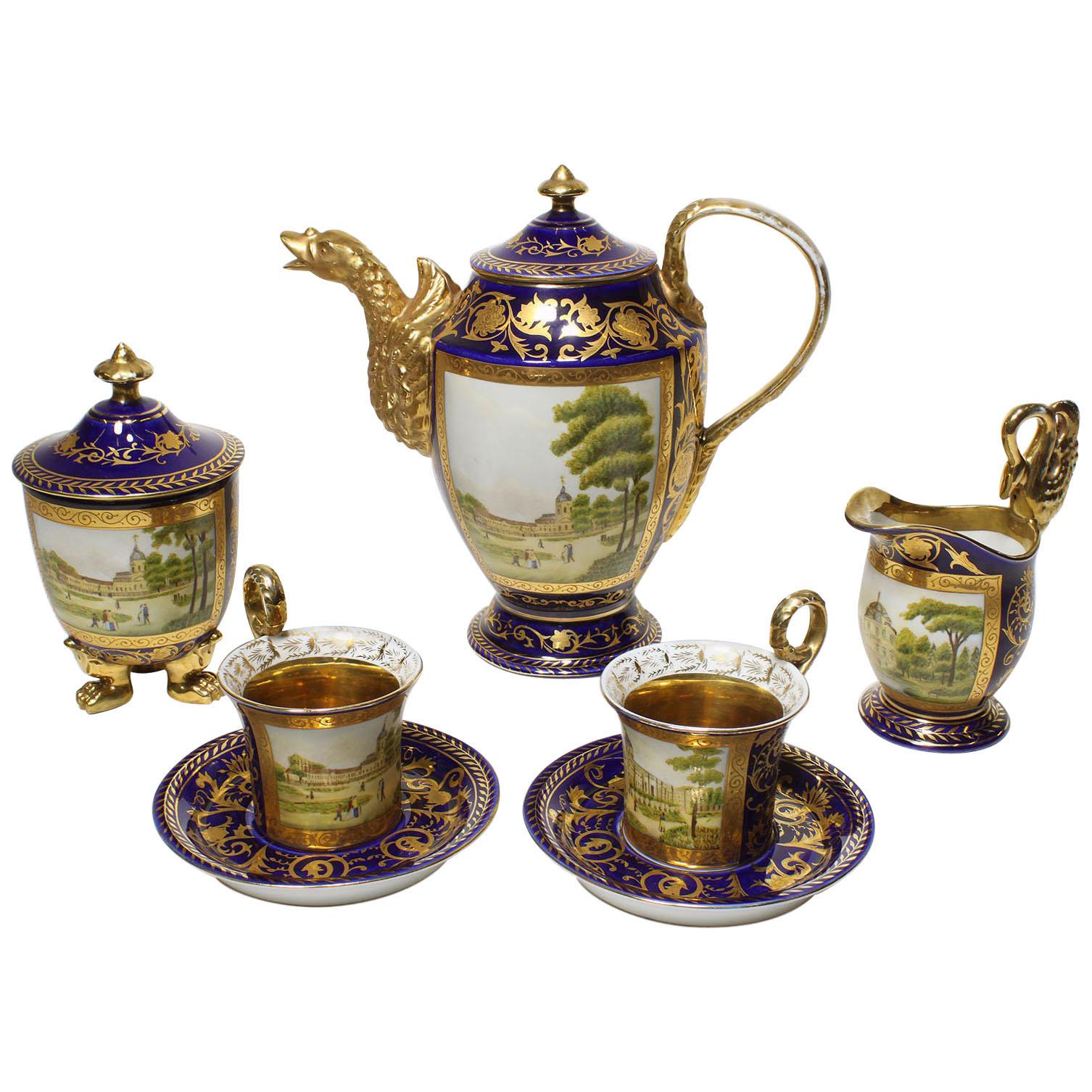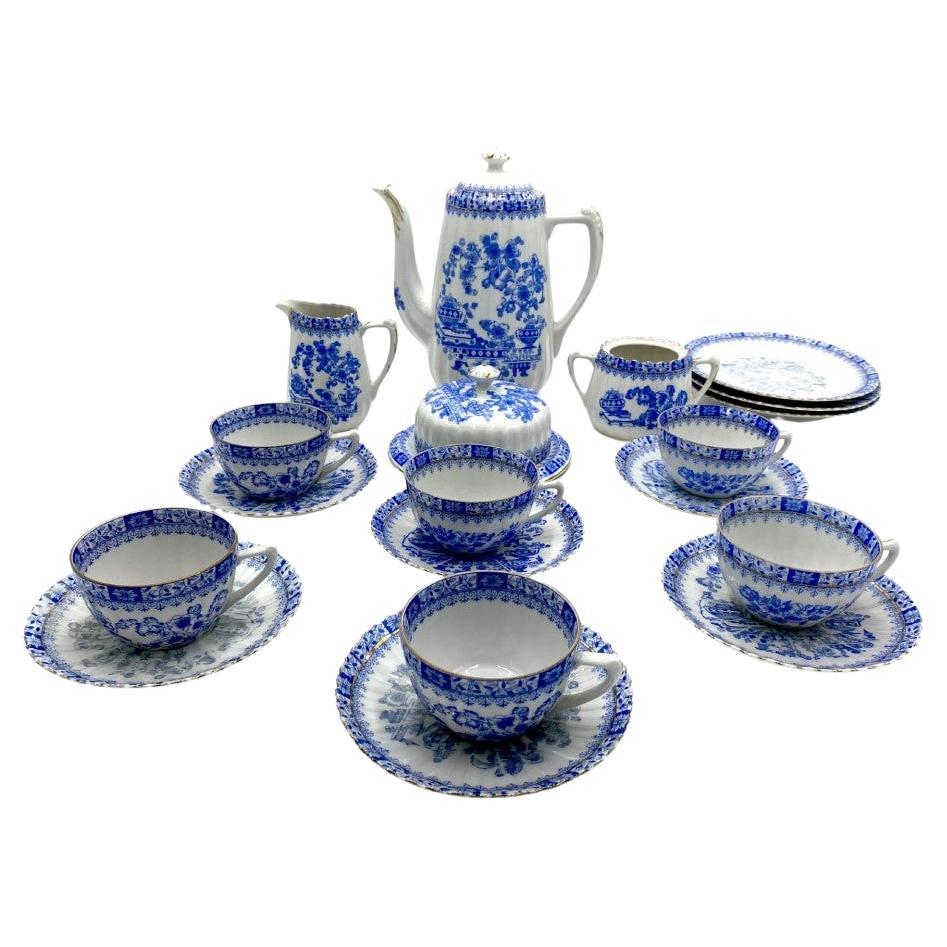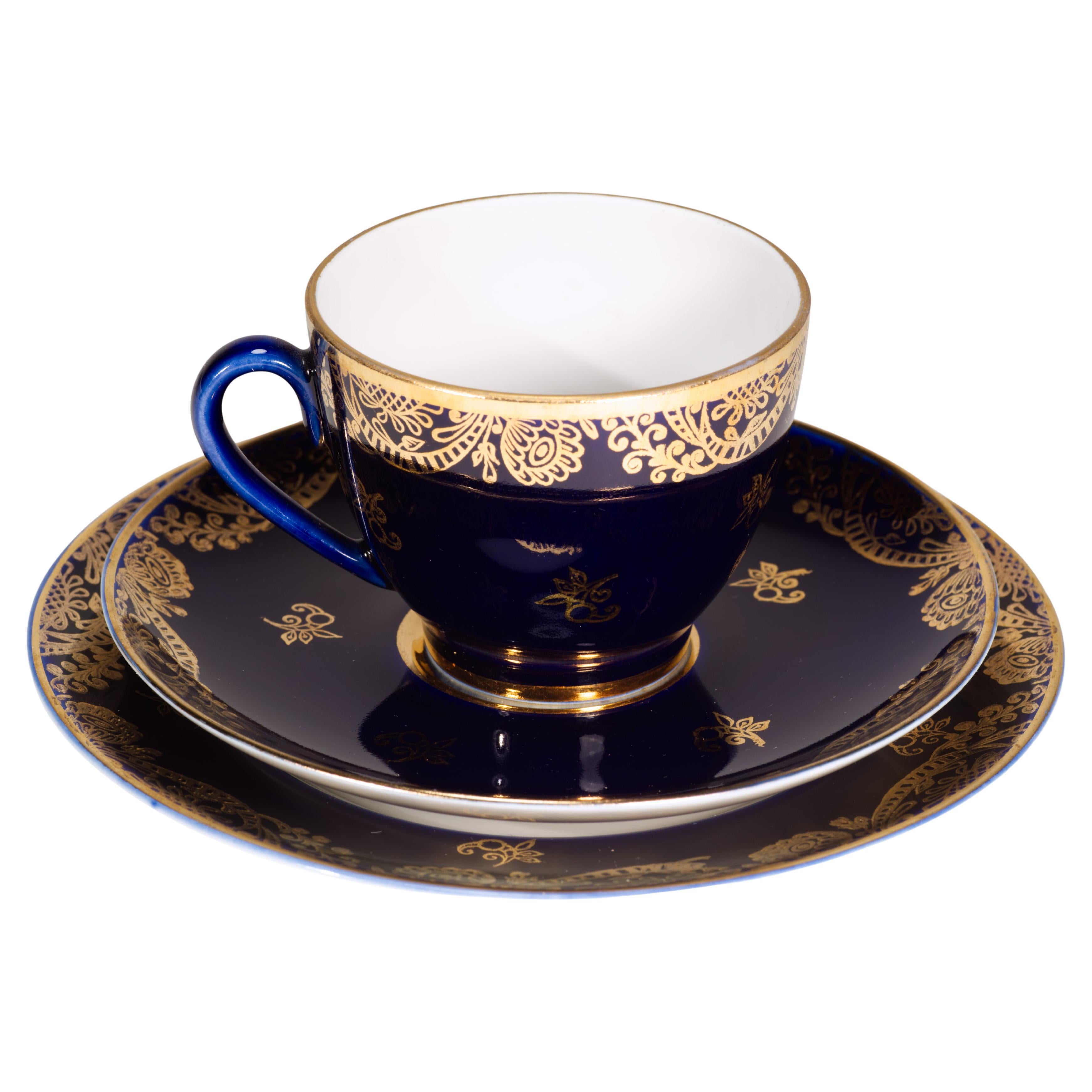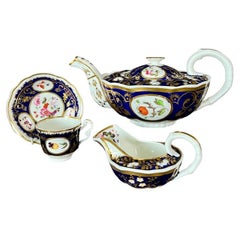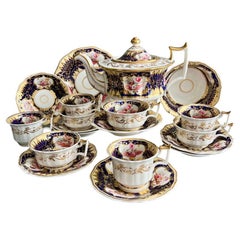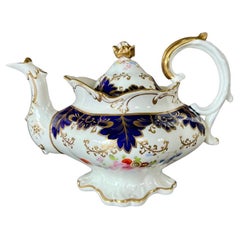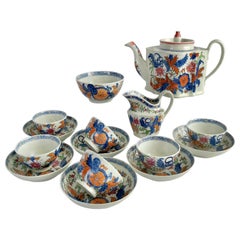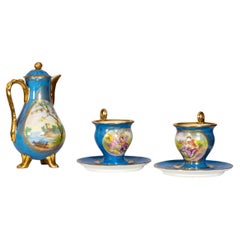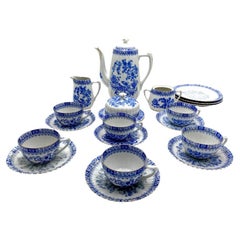Items Similar to Samuel Alcock Porcelain Solitaire Tea Set, Cobalt Blue, Gilt, Landscapes, ca1825
Want more images or videos?
Request additional images or videos from the seller
1 of 18
Samuel Alcock Porcelain Solitaire Tea Set, Cobalt Blue, Gilt, Landscapes, ca1825
$1,012per set
$1,265per set20% Off
£760.24per set
£950.30per set20% Off
€876.68per set
€1,095.85per set20% Off
CA$1,404.28per set
CA$1,755.35per set20% Off
A$1,560.47per set
A$1,950.58per set20% Off
CHF 817.70per set
CHF 1,022.13per set20% Off
MX$19,136.35per set
MX$23,920.43per set20% Off
NOK 10,429.30per set
NOK 13,036.63per set20% Off
SEK 9,811.51per set
SEK 12,264.38per set20% Off
DKK 6,543.19per set
DKK 8,178.99per set20% Off
Shipping
Retrieving quote...The 1stDibs Promise:
Authenticity Guarantee,
Money-Back Guarantee,
24-Hour Cancellation
About the Item
A solitaire tea set consisting of a teapot with cover on a stand and a trio consisting of a teacup, a coffee cup and a saucer, in “half orange” shape with deep cobalt blue and yellow/gilt latticed ground and very finely painted landscapes
Pattern 2085
Year: ca 1825
Size: teapot 27cm (10.5”) from handle to spout
Condition: excellent, some rubbing, tiny chip off tip of spout teapot; stress line in teapot cover; all suitable for use
The Samuel Alcock factory was operative in Staffordshire between 1822 and 1856, after which it was bought by Sir James Duke and Nephews. The factory started as a partnership between the young Samuel Alcock and the older Ralph Stevenson, who provided the factory and capital. Alcock quickly took the factory to great heights, building one of the biggest factories of its time. Alcock jumped on the new Rococo Revival fashion and served a huge new middle class market. The reason we now don't hear much about Samuel Alcock porcelain is that much of it has been mis-identified over the years and attributed to Coalport, Ridgway, Rockingham or others; Alcock did not mark any of his porcelain save a few rare pieces, and the numbering system is difficult to understand. However, the wares are still wide spread and many are of great quality.
This item forms part of the Murray Pollinger Collection of Samuel Alcock Porcelain.
Murray Pollinger was a passionate collector of Samuel Alcock porcelain. He was known as a true gentleman, impeccably dressed, always kind and modest - even some of his porcelain collecting friends had no idea about the size and importance of his collection. From the mid 1980s until shortly before his death in 2022 he collected many thousands of pieces and painstakingly catalogued them. He also went on trips to Staffordshire to discover the history of Samuel Alcock from whatever little documentation has been preserved. Through his painstaking work, Pollinger was able to make sense of the pattern numbering system that was used, and this was a huge step forward in identifying and understanding the porcelain. A website with the results of his research will be made availabe over the course of 2023. While he sold off about half of his collection in 2016, the remaining half is now made available to a new generation of collectors.
Antique British porcelain is never perfect. Kilns were fired on coal in the 1800s, and this meant that china from that period can have some firing specks from flying particles. British makers were also known for their experimentation, and sometimes this resulted in technically imperfect results. Due to the shrinkage in the kiln, items can have small firing lines or develop crazing over time, which should not be seen as damage but as an imperfection of the maker's recipes, probably unknown at the time of making. Items have often been used for many years and can have normal signs of wear, and gilt can have signs of slight disintegration even if never handled. I will reflect any damage, repairs, obvious stress marks, crazing or heavy wear in the item description but some minor scratches, nicks, stains and gilt disintegration can be normal for vintage items and need to be taken into account.
There is widespread confusion on the internet about the difference between chips and nicks, or hairlines and cracks. I will reflect any damage as truthfully as I can, i.e. a nick is a tiny bit of damage smaller than 1mm and a chip is something you can easily see with the eye; a glazing line is a break in the glazing only; hairline is extremely tight and/or superficial and not picked up by the finger; and a crack is obvious both to the eye and the finger. Etcetera - I try to be as accurate as I can and please feel free to ask questions or request more detailed pictures!
- Creator:Samuel Alcock & Co. (Maker)
- Dimensions:Height: 1 in (2.54 cm)Width: 1 in (2.54 cm)Depth: 1 in (2.54 cm)
- Sold As:Set of 6
- Style:Regency (Of the Period)
- Materials and Techniques:
- Place of Origin:
- Period:
- Date of Manufacture:circa 1825
- Condition:Wear consistent with age and use. excellent, some rubbing, tiny chip off tip of spout teapot; stress line in teapot cover; all suitable for use.
- Seller Location:London, GB
- Reference Number:Seller: MP-ALC601stDibs: LU4805137487872
About the Seller
5.0
Gold Seller
Premium sellers maintaining a 4.3+ rating and 24-hour response times
Established in 2016
1stDibs seller since 2019
225 sales on 1stDibs
- ShippingRetrieving quote...Shipping from: London, United Kingdom
- Return Policy
Authenticity Guarantee
In the unlikely event there’s an issue with an item’s authenticity, contact us within 1 year for a full refund. DetailsMoney-Back Guarantee
If your item is not as described, is damaged in transit, or does not arrive, contact us within 7 days for a full refund. Details24-Hour Cancellation
You have a 24-hour grace period in which to reconsider your purchase, with no questions asked.Vetted Professional Sellers
Our world-class sellers must adhere to strict standards for service and quality, maintaining the integrity of our listings.Price-Match Guarantee
If you find that a seller listed the same item for a lower price elsewhere, we’ll match it.Trusted Global Delivery
Our best-in-class carrier network provides specialized shipping options worldwide, including custom delivery.More From This Seller
View AllSamuel Alcock Solitaire Tea Set, Cobalt Blue, Gilt Vines and Flowers, ca 1825
By Samuel Alcock & Co.
Located in London, GB
A solitaire tea set consisting of a teapot with cover, a milk jug and a small cup and saucer, in “melted snow” shape, the cup with double drop handle, with deep cobalt blue ground, r...
Category
Antique 1820s English Regency Tea Sets
Materials
Porcelain
$952 Sale Price / set
20% Off
Free Shipping
Yates Tea Service, Cobalt Blue, Gilt and Flowers patt. 1038, ca 1825
Located in London, GB
This is beautiful tea service consisting of a teapot with cover, a plate, a slop bowl, four teacups on saucers and four coffee cups on saucers. The service was made by the Yates fact...
Category
Antique 1820s English Regency Tea Sets
Materials
Porcelain
$2,740 Sale Price / set
20% Off
Free Shipping
Samuel Alcock Porcelain Teapot, Blue, Gilt and Flowers, Rococo Revival ca 1837
By Samuel Alcock & Co.
Located in London, GB
A teapot with cover in the “rustic bean” shape, cobalt blue ground with gilt acanthus motif and finely painted flower posies on the belly of the teapot
Pattern 5782
Year: ca 1837
Si...
Category
Antique 1830s English Rococo Revival Tea Sets
Materials
Porcelain
$600 Sale Price
20% Off
Free Shipping
New Hall Porcelain Tea Service, Japanese Tobacco Pattern, Georgian, circa 1795
By New Hall
Located in London, GB
This is a stunning tea service made by New Hall in circa 1795. The service is made of hybrid hard paste porcelain and decorated in a bold Chinoiserie pattern of large flower sprays. The service consists of a teapot with cover, a milk jug, a slop bowl, and six tea bowls with saucers.
This service has provenance; it came from the collection of David Redstone, the well known porcelain expert who wrote leading books on Bow and Chelsea porcelain.
The New Hall factory started as a cooperative of several Staffordshire potters making use of the porcelain license of Bristol Porcelain...
Category
Antique 1790s English George III Tea Sets
Materials
Porcelain
$2,320 Sale Price / set
20% Off
Free Shipping
Samuel Alcock Teacup and Milk Jug, Pale Yellow, Gilt and Flowers, ca 1824
By Samuel Alcock & Co.
Located in London, GB
A teacup and saucer with milk jug in the “melted snow” shape with double drop handles, pale yellow ground with rich gilt and cobalt blue acanthus pattern and finely painted flower re...
Category
Antique 1820s English Regency Tea Sets
Materials
Porcelain
$496 Sale Price / set
20% Off
Free Shipping
Samuel Alcock Tearcup Trio, Maroon, Yellow, Gilt and Fine Landscapes, ca 1845
By Samuel Alcock & Co.
Located in London, GB
A true trio consisting of a teacup, a coffee cup and a saucer, “rustic bean” shape, in deep maroon and pale yellow ground, with gilt and finely painted landscape reserves
Pattern 95...
Category
Antique 1840s English Rococo Revival Tea Sets
Materials
Porcelain
$348 Sale Price / set
20% Off
Free Shipping
You May Also Like
Sèvres Blue and Gold Porcelain Tea Set by Émile Grisard, 19th Century
By Manufacture Nationale de Sèvres, E. Grisard 1
Located in Lisbon, PT
This 19th century tea set was crafted by the prestigious Manufacture Nationale de Sèvres, one of France’s most esteemed porcelain factories. The set includes a gracefully curved teap...
Category
Antique 19th Century French Rococo Revival Tea Sets
Materials
Porcelain
$3,546 Sale Price / set
20% Off
Berlin KPM Porcelain Five-Piece Cobalt-Blue and Parcel-Gilt Coffee Set
By Kerafina Royal Porzellan KPM
Located in Los Angeles, CA
A very fine 19th century Berlin KPM Porcelain Royal five-piece cobalt-blue and 24-carat gold parcel-gilt coffee set. The finely painted and decorated two-serving suite comprising of ...
Category
Antique Late 19th Century German Empire Revival Tea Sets
Materials
Porcelain
$4,850 Sale Price / set
35% Off
Porcelain Tea or Coffee Set, Rosslau China Blau
Located in Chorzów, PL
Porcelain set, Rosslau China Blau.
Breakfast set from the Hermann Schomburg & Söhne Porzellan Rosslau manufacture, China Blau collection. Very good condi...
Category
Vintage 1980s German Porcelain
Materials
Porcelain
$335 Sale Price / set
20% Off
Lomonosov Porcelain Set of Cup, Saucer, and Plate, Cobalt Blue & Gold 1986-1992
By Lomonosov
Located in Clifton Springs, NY
Rare set of cup, saucer, and dessert plate features highly detailed gold borders and small abstract flower motifs on deep cobalt blue background. The rims of all 3 pieces and inner ...
Category
Late 20th Century Russian Arts and Crafts Porcelain
Materials
Gold
Vienna Imperial Porcelain Coffee Service, 8 People, Prussian Blue & Gold, 1825
By Viennese Imperial Porcelain Manufactory
Located in Vienna, AT
Elegant 19-piece coffee service consisting of a coffee pot, a large milk or hot water pot, a large sugar urn and eight coffee cups with saucers.
Large bulbous vessels on stepped stan...
Category
Antique 1820s Austrian Biedermeier Porcelain
Materials
Porcelain
9 Pc, 18th C. Chinese Export "Fitzhugh Gold" Blue & White Porcelain Coffee Set
Located in Atlanta, GA
Chinese, 18th century.
A nine peice grouping of Chinese export porcelain for the American or European market in the famous "Fitzhugh Gold" pattern. The Fitzhugh pattern is named after Englishman Thomas Fitzhugh who was the director of the British East India Company...
Category
Antique 18th Century Chinese Chinese Export Ceramics
Materials
Porcelain
$1,996 Sale Price / set
20% Off
More Ways To Browse
Stained Glass Dress
Antique Regency Dress
Made In England Teapots
Orange Tea Set
Antique Tea Dress
Silver Teapot On Stand
Hand Painted China Tea Set
Silver Gilt Teapot
Yellow Tea Cups
Chinese Teacup
Cup Saucer Antique China
Antique Teacups And Saucers
Collectible Teapots
Antique Tea Cup Collection
Cobalt Blue Tea Set
Silver Rococo Tea Set
British Tea Cups
Rococo Teapot
